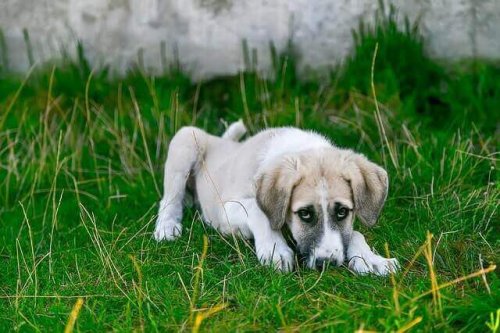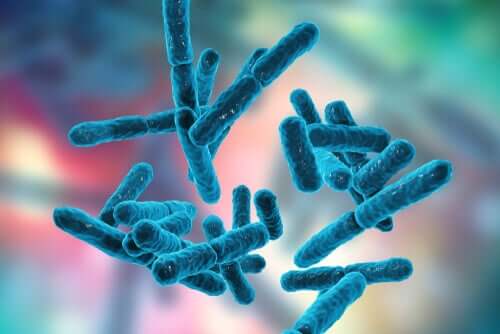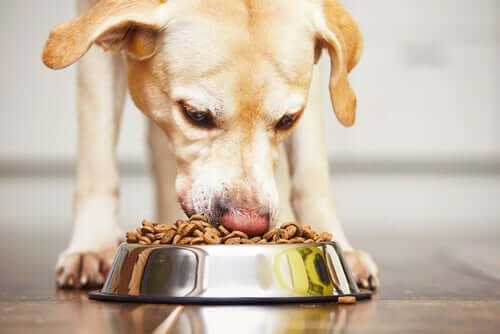Gut Flora: Restore Your Pet's Intestinal Balance

There are all kinds of microorganisms inside animal intestines. Gut flora is highly beneficial for the good functioning of our digestive system. These bacteria are present in specific numbers and proportions.
When the good bacteria vs bad bacteria ratios are out of sync, then conditions such as diarrhea, poor digestion, and vomiting begin to appear. Today you’ll learn the importance of gut flora in dogs and cats. You’ll also know how to restore it when it becomes unbalanced.
Why is gut flora so important?
In order to restore intestinal balance, then you must restore gut flora to its normal ratio. These friendly microorganisms contribute to the proper functioning of an animal organism by:
- Absorbing nutrients into the metabolism. They retrieve nutrients from foods you can’t digest such as short-chain fatty acids. The good bacteria also synthesize B and K vitamins. In addition, they favor the absorption of minerals such as calcium. Not only that, but they also produce other substances that are useful in the regulation of your metabolism.
- Gut flora protects by acting as a barrier against unfriendly microorganisms. It also prevents the overgrowth of other nasty microbial species that could harm your body. Microbiota balance could also get out of whack by the use of antibiotics.
- Some bacterial strains help the proliferation and differentiation of intestinal tissue. They basically do bowel maintenance.
- The immune system cells mature inside the digestive tract. In the intestinal mucosa, the defensive cells are constantly exposed to antigens –this phenomenon is the reason for food intolerance.
What bacteria comprise the gut flora?

We acquire gut flora right after birth. The greatest amount of this bacteria is in our small intestine. Breastfeeding is the most efficient way to acquire microbiota and antibodies.
In animals, the first bacteria that colonize the digestive tracts are the Escherichia and Lactobacillus. As time goes by, we end up with a full balanced ecosystem of many different species. Bifidobacterium is one of the most prevalent ones.
Lactobacillus and Bifidobacterium generate lactic acid. This substance alters the digestive pH and is harmful to bad bacteria. It’s just how a protective environment arises.
The aforementioned friendly bacteria are also capable of creating pathogen-inhibiting substances such as Enterobacteriaceae. Thus, they maintain a balance in the bacterial population. In fact, these bacteria are probiotic.
Probiotics and prebiotics
Probiotics
- A regular at the intestinal tract.
- Neither toxic nor pathogenic, it has no ill intentions.
- Able to multiply exponentially.
- Stable when it comes into contact with gastric juices, bile, enzymes, and oxygen.
- Able to stick to the intestinal mucosa.
- Capable of colonizing the digestive system.
- A great producer of beneficial microbial substances.
There are many natural probiotic foods. Check with your veterinarian to find out what foods would suit your pet. There are also lyophilized probiotics for pets. The best sources for it are kefir and yogurt (make sure it’s the real kind as there are many lifeless fakes in the grocery aisles).
Prebiotics

Prebiotics are oligosaccharides often present in food. In addition, they favor the growth of certain strains of friendly bacteria, mainly Bifidobacteria and Lactobacilli. They’re often present in dog and cat food listed as FOS, MOS. These initials stand for the types of oligosaccharides it contains.
Prebiotics are also present in many natural foods such as garlic, beetroot, and chicory among others.
So, yes, if your dog or cat recently had digestive problems such as vomiting, diarrhea, abnormal stools, or was taking antibiotics, then a veterinarian will most likely recommend one of these supplements to restore the gut flora in dogs and cats. The most common products come in the form of powders to add to their food.
Microbiota is essential for the proper functioning of a mammal’s digestive system. An imbalance in the populations of bacteria can lead to indigestion, vomiting, and diarrhea.
So, restore the intestinal balance of your pets, and even yours, with the inclusion of probiotics. It’s a great way to recover the health of your friend and also prevent future disease. Therefore, a proper diet rich in nutrients will also provide the appropriate substrate for gut flora. It’s essential for the good health of your pet.
All cited sources were thoroughly reviewed by our team to ensure their quality, reliability, currency, and validity. The bibliography of this article was considered reliable and of academic or scientific accuracy.
- F. Guarner, JR. Malagelada.La flora bacteriana del tracto digestivo. Unidad de Investigación de Aparato Digestivo. Hospital Universitari Vall d’Hebron. Barcelona. Vol. 26. Núm. S1. páginas 1-84 (2003).
- Cortez RJ; Aranguren AJ; Gonzalez, M; Perazzo Y; López-Ortega AA. Aislamiento e identificación de bacterias ácido láctico del género Lactobacillus spp a partir de heces de perros (Canis lupus falmiliaris) mestizos lactantes. Gaceta de Ciencias Veterinarias Vol 19 N°1 pp 5-10 (2014).
-
N. Corzo, J. L. Alonso, F. Azpiroz, M. A. Calvo, M. Cirici, R. Leis, F. Lombó, I. Mateos-Aparicio, F. J. Plou, P. Ruas-Madiedo, P. Rúperez, A. Redondo-Cuenca, M. L. Sanz y A. Clemente. Prebióticos; concepto, propiedades y efectos beneficiosos. Nutr Hosp. 2015;31(Supl. 1):99-118 (2015).